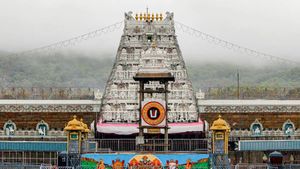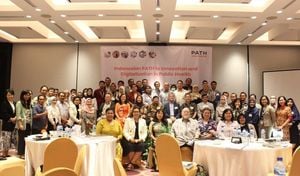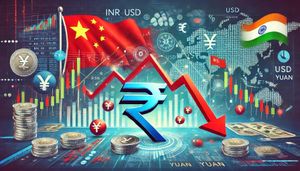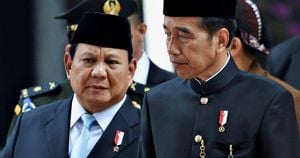Pacific Islands are witnessing significant shifts as concern grows over China's increasing influence. These small nations, dotted across the vast expanse of the Pacific, find themselves at the crossroads of global power dynamics, most visibly shaped by the tug-of-war between the United States and China.
Recent developments have intensified discussions surrounding Australia’s proposals for enhanced police involvement across the Pacific, particularly following unrests like those observed recently in New Caledonia. Pacific leaders have rallied to support Australia’s Pacific Policing Initiative (PPI), as tensions rise amid continuing calls for independence from France among the Indigenous Kanak population.
New Caledonia’s situation summarizes the complexity of the region: Following deadly riots and persistent demands for independence, the peacekeeping proposals have emerged as potential solutions to quell unrest. Leaders from Fiji, Tonga, and the Cook Islands, acting on behalf of the Pacific Islands Forum (PIF), toured New Caledonia to assess the situation on the ground. Fiji's Prime Minister Sitiveni Rabuka, who expressed readiness to facilitate dialogue, noted the mission aimed to engage both triumphant Indigenous voices and the French government. Rabuka even suggested the possibility of deploying police forces to New Caledonia if encouraged by both local and French officials.
Such propositions do not come without friction. French authorities, who maintain control over security matters, question the necessity of external policing. Veronique Roger-Lacan, France's Ambassador to the Pacific, emphasized France’s role, casting doubt on the need for PPI involvement, reiteratively declaring, "security is the exclusive competence of the French State." The French government continues to assert its influence and authority over New Caledonia, even as violence and unrest pose challenges to stability.
Comparatively, another dimension of geopolitical intrigue plays out as Palau heads toward its electoral season this November, whereby the outcome could lead to shifting alliances potentially beneficial to China. The nation’s upcoming elections will challenge the close ties it has maintained with the United States and Taiwan amid growing attention from Beijing.
Palau is one of the last remaining nations maintaining diplomatic relations with Taiwan, putting it on Beijing’s radar. The stakes are high not just for local candidates, but also for foreign powers eyeing potential diplomatic shifts. The elections will see incumbent President Surangel Whipps Junior facing off against seasoned politician Tommy Remengesau Junior, amid discussions of potential diplomatic orientations toward China should Remengesau win, raising eyebrows across the Pacific.
What complicates this potential pivot is the nature of Palauan politics, distinctively verbal, where no formal party system exists, and where relationships dictate political alliances. The electorate consists of just 16,000 registered voters, and as alliances form based on clan affiliations, opinions on foreign policy can sway rapidly based on candidate preferences.
Concerns about Chinese influence resonate widely. Media investigations suggested attempts by businessmen with Chinese connections to establish influence through media channels on the island, intensifying apprehensions about the depth of China's outreach to Pacific elites. The disrupted media deal previously proposed by Chinese interests showcased attempts at establishing control over public narratives, raising alarms of creeping control.
This situation is exacerbated by the perception of vulnerability among Pacific nations to external pressures from larger powers, especially as they navigate local demands for autonomy and self-determination. This interconnectedness of political dynamics, both local and international, adds layers of complexity to the region’s stability.
Palau’s media environment, predominantly independent and praised for its freedom compared to the broader Pacific spectrum, indicates resilience against direct Chinese control, though the already charged political atmosphere concerning diplomatic ties adds to the precarious balance.
Further complicity emerges through internal allegations of corruption linked with existing political elites, where recent instances of misuse of position for personal gain surface alongside the backdrop of geopolitical maneuvers. Such issues threaten to undermine local governance before the upcoming elections, indicating the fragility of self-governance amid foreign entanglements.
Adding to the tension, there are growing concerns over the potential rise of pro-China sentiments through local political candidates seen to exhibit pro-Beijing inclinations. The narrative fuels speculation and fear of Pacific nations severing democratic ties entirely if susceptibility to foreign influence takes precedence. Such speculation can lead to knee-jerk policy reactions by abroad powers, with expectations for immediate counter-actions against perceived threats arising from political shifts.
But the question remains: can Pacific power brokers strike balance where global interests collide? The answers appear elusive. What is clear, as Pacific Islanders grapple with the realities of international power plays, is the importance of fostering genuine dialogue and partnerships among themselves. Only through local resolve will these nations stand resilient against overwhelming external pressures. Autonomy calls are muddy but unequivocally rise from the aspirations of the Kanaks across New Caledonia to the looming electoral tide washing over Palau. This story is just beginning to unfurl, and for now, it hangs delicately on the knife-edge of diplomacy and self-determination.



